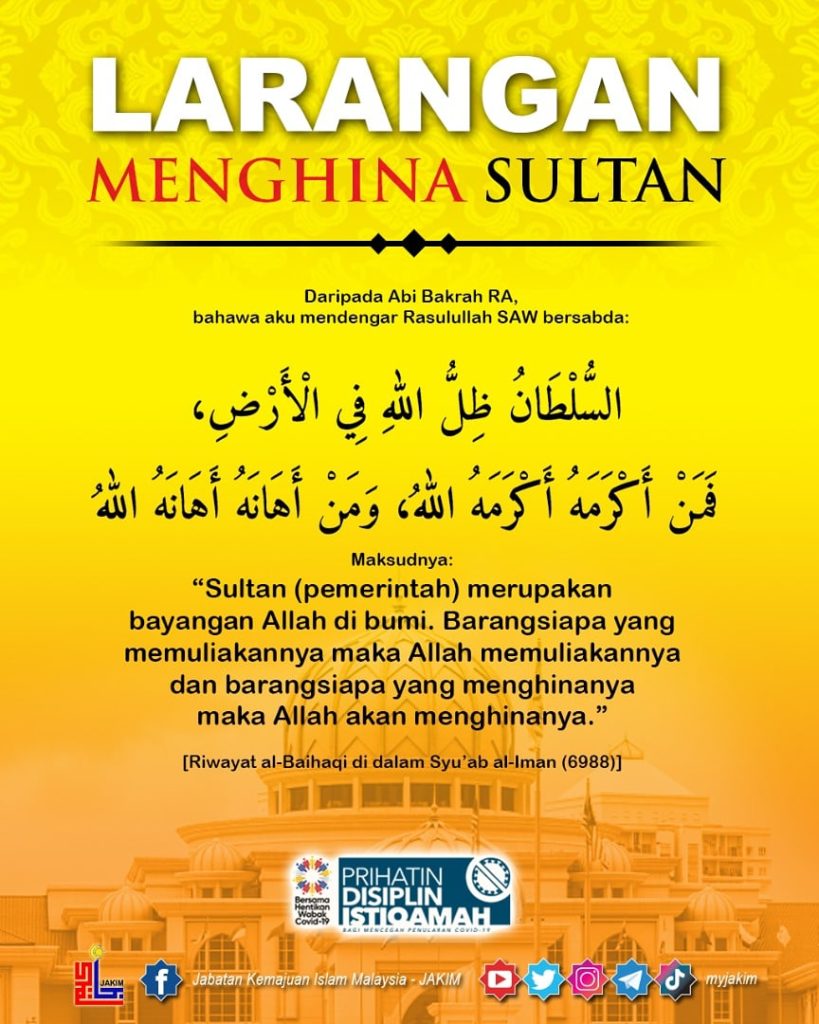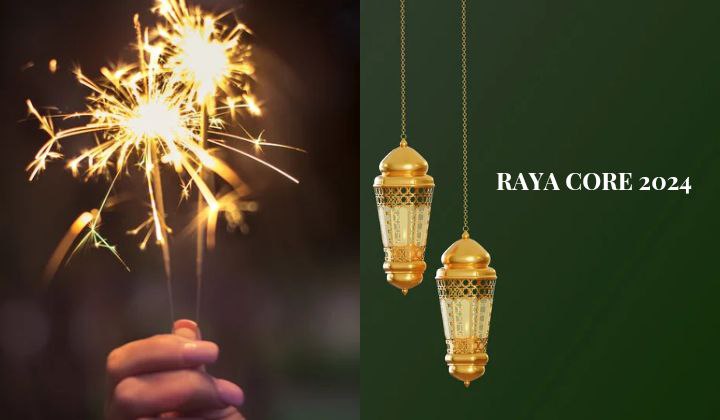A Hadith About Prohibitions Against Insulting The Sultan? What Do Muslim Scholars Have To Say About It
Islamic scholars consider the Hadith in question to be ‘Hadith Dhaif’ or cannot be practiced literally without further interpretation.

Subscribe to our Telegram channel for the latest stories and updates.
A peculiar PSA posted by the Department of Islamic Development Malaysia (JAKIM) on its official social media channels took Malaysian off guard today (3 May).
The posting contained a message in bright-bold letters which reads, “Prohibition Against Insulting the Sultan”, accompanied by a ‘Hadith’ from the Prophet Muhammad S.A.W.
The Sultan (ruler) is the shadow of Allah on earth. So whoever honours him, Allah shall honour him, and whoever insults him, Allah will insult him.”
Hadith by Abu Bakrah quoted by JAKIM in its poster.
As the message continued to spread online, questions arose on the validity of the Hadith as well as what Muslim scholars had to say about it.

Where do we start?
A Hadith can best be described as the spoken words, deeds, confessions, attributes as well as acts of approval given by the Prophet Muhammad S.A.W.
In a way,(and believe me when I say that I am oversimplifying this) it is like a collection of stories about the Prophet which had been witnessed, heard, lived through; then retold by people who were close to him.
Now before we move on, it is crucial to point out that Hadiths are different from the ‘Sunnah’ of the Prophet S.A.W.
Although both Hadiths and Sunnah share the same attributes as being collections of the ways of the Prophet, the Sunnah are considered as the undoubtable teachings of Muhammad and his life.
In Islamic teachings, the Hadiths are used to complement the two main pillars of belief in Islam – the Quran and the Sunnah.
According to the Office of the Federal Territory (FT) Mufti, Hadiths can be separated into two general categories;
‘Maqbul’ or accepted Hadiths, which includes;
- ‘Hadith Sahih’ – Hadiths that can be traced back to their original source without any irregularities.
- ‘Hadith Hasan’ – Hadith that can be traced back to its original source with some irregularities.
‘Mardud’ or rejected Hadiths, which includes;
- ‘Hadith Maudhu’ – false or fake Hadith.
- ‘Hadith Dhaif’ – Hadiths that can’t be traced back to their original source or do not meet the necessary requirements to be used as an accepted Hadith. These Hadiths cannot be used in practice literally or in an absolute sense.
God’s shadow on earth?
As it turns out the FT Mufti’s office had already discussed the particular Hadith quoted by JAKIM in its 281st issue of the Irsyad Al-Hadith series.
In the Irsyad Al-Hadith, it is said that there are several different Hadith, from different sources, which mentions Muslim rulers as ‘Allah’s shadow on earth’, however, these verses have been strictly scrutinised by Islamic scholars who believe the Hadith to be in need of further interpretation.
Some scholars move to describe that the Hadith can mean that a just Muslim ruler is akin to a cool shade for people in need of shelter. While others say that the Hadith can be interpreted to mean that a ruler holds special positions over everyone else.
In its conclusion, the FT Mufti’s office explains that any Hadith mentioning rulers as Allah’s shadow are to be considered as Hadith Dhaif.
They interpreted the verses to show that leaders or rulers possess a special position when compared to the rakyat under their rule.
A similar interpretation was repeated by the Religious Affairs Minister Datuk Dr. Zulkifli Mohamad Al-Bakri who came out on social media to explain that ‘Allah’s shadow’ can be described as ‘a place for shade’ and how a ruler’s just and fair reign can bring shelter to the people, or invoke the meaning of prestige and power.
Bayangan Allah itu menurut al-Tanwir Syarah al-Jami’ al-Saghir seperti tempat berteduh dan perumpamaan teduhan apabila pemerintah itu memerintah dengan adil. Ia juga bermakud kemuliaan dan kekuasaan. Saya telah jelaskan sejak 2018. Baca terlebih dahulu sebelum cipta persepsi. https://t.co/o5sBt4J9PB
— 🇲🇾 Dr. Zulkifli Mohamad Al-Bakri (@drzul_albakri) June 3, 2021
The minister also offered a reading list for those who’d like to acquire further knowledge on the Hadith and how it can be practised. We’ve listed em’ down here for your convenience;
Share your thoughts with us via TRP’s Facebook, Twitter, and Instagram.
Typing out trending topics and walking the fine line between deep and dumb.








